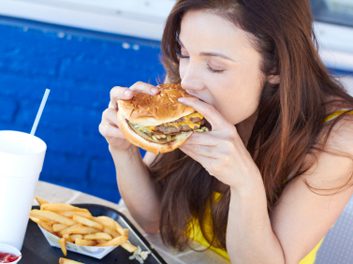
You’re reaching for an unattainable goal
Like it or not, we can’t all be runway-model thin-whether you’re shaped like Naomi Campbell or Oprah Winfrey (both gorgeous women, by the way) is largely determined by your genetics. “If I take two people who have different genes and I put them in a controlled room and feed them the exact same amount of calories, one can gain weight and the other could maintain his weight. That is genetic,” says Dr. Arya Sharma, chair for Cardiovascular Obesity Research and Management at the University of Alberta.

You still drink soda
Most soft drinks and processed foods contain high-fructose corn syrup, a cheap sugar substitute that a recent Yale study linked to obesity. ??The study, which was published in the Journal of the American Medical Association, found that consuming fructose doesn’t satisfy one’s appetite. “The desire to eat continues,” Yale University endocrinologist Dr. Robert Sherwin told CTV. “It isn’t turned off.”??In other words, high-fructose corn syrup contributes to weight gain by increasing hunger.

You eat too fast
Remember when your mother told you to chew your food slowly? Well, it turns out that she was right. “Eating fast does not allow your brain to react to the satiety signal coming from your body,” says Richard Béliveau, chair for cancer prevention and treatment at the University of Quebec in Montreal and author of Eating Well, Living Well. This will lead you to believe that you are still hungry when your body really just needs some time to tell your brain that you’re full.

You’re not getting enough sleep
Not only do we crave unhealthy comfort foods when we’re tired, but our sleep levels are linked to our hormone levels, says Joey Shulman, the Thornhill, Ont.-based author of The Last 15-A Weight Loss Breakthrough. “People who are sleep-deprived tend to have more secretions of the hormone cortisol, so they’re more stressed out. And that’s going to trigger fat storage as well,” she says.

Your old habits are sneaking up on you
It’s easy to get complacent when you’ve been dieting for a while. If you’ve slipped back into bad habits like plastering butter on your toast, nibbling while you’re cooking or having dessert every night, you may be taking in enough extra calories to prevent yourself from losing weight.

You don’t stick to your diet on the weekends
Many of us eat more on the weekend than during the week-researchers at the Washington University School of Medicine in St. Louis found that dieters lost weight on weekdays but not on Saturday and Sunday. ??Planning ahead for regular, healthy meals at the weekend helps, as does paying attention to portion sizes (especially when eating out).
Related:
• How diets make you fat
• How to stay motivated to lose weight
• 10 incredibly easy ways to lose weight
